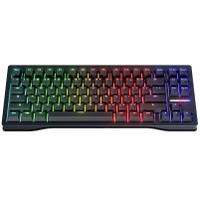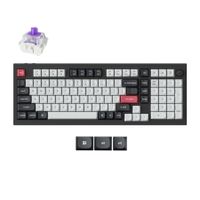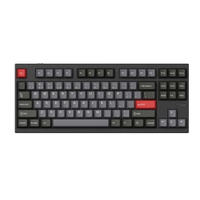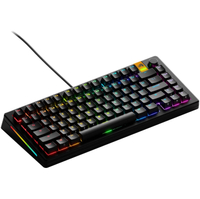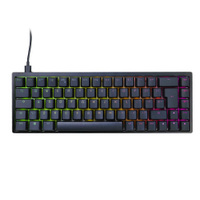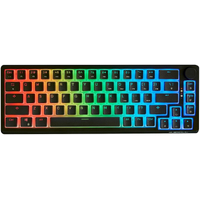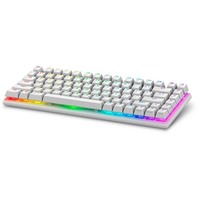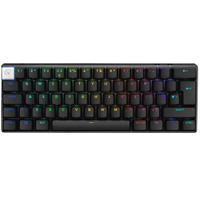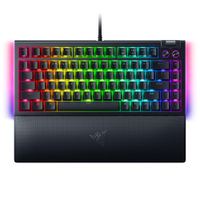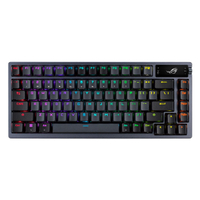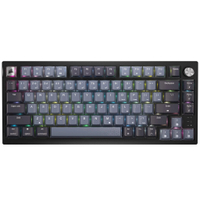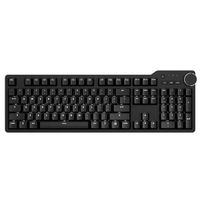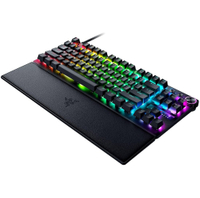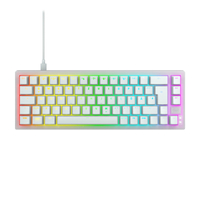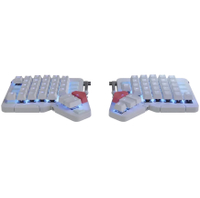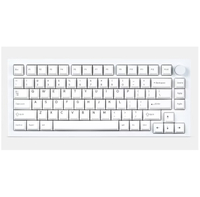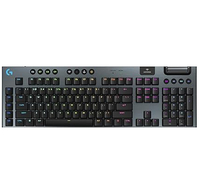Best gaming keyboards: the fastest, smoothest and loveliest keyboards I've tested
The best gaming keyboards have it all: style, ergonomics, and of course, the most satisfying clickity clacks.
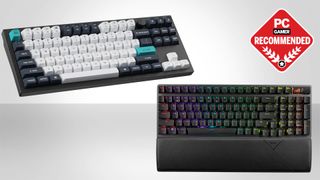
When searching for the best gaming keyboard we keep an eye out for features, feel, and value for money. Each of the gaming keyboards in this guide delivers on these three points, though we've focused on various price points to cater to any sort of budget.
The best gaming keyboard right now is the Asus ROG Strix Scope II 96 Wireless. It excels in every aspect—superb mechanical feel and a full-size yet compact design. But if you want to go for something cheaper, we've been blown away by the Mountain Everest 60 and its recent price drops which easily make it the best budget gaming keyboard in 2024.
One vital aspect of any gaming keyboard purchase is whether to pick a mechanical keyboard. Generally, we'd say it's always worthwhile considering a mechanical switch over a membrane one. They feel much better for typing and gaming and they're generally quicker. Though nowadays we're seeing more and more specialised switches, such as Hall effect, optical, and even induction, which are becoming great picks for competitive gamers due to features like rapid trigger.

There are few keyboard enthusiasts as enthusiastic as our Jacob. He's been professionally testing for many years now, and has been collecting mechanical key switches like Smaug hoarded gold for years before that. Whether it's Hall effect or straight mechanical, he's poked and prodded more keyboards and switches than any one man should, and is our expert on all things keeb.
The quick list
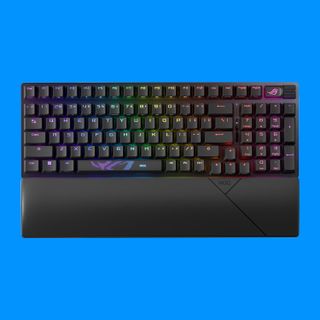
The best overall
The Strix Scope II 96 may have a ridiculous name but it's still a dream to game and type on. Silky smooth switches and clever media keys make this the best gaming keyboard right now.
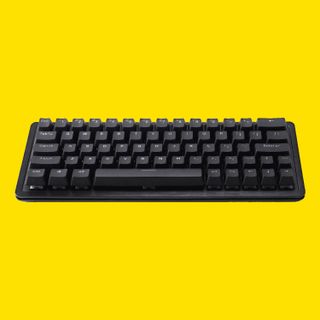
The best budget
Mountain has taken all it's learnt from its first keyboards and created the best-feeling, most usable 60% gaming keyboard I've ever used. It's solid, reliable, responsive, and offers the best typing experience around. Oh, and it's now incredibly cheap, making it a fantastic choice for those on a budget.
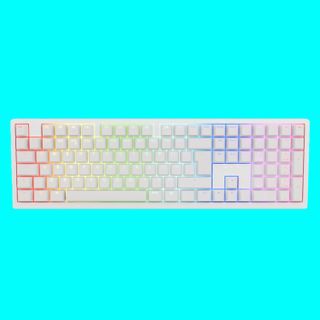
The best mid-range
Gaming keyboards are soaring in price these days, but not all. We have a few budget picks in this guide, though for just a little more you can score this fantastic Ducky. It's mechanical, lit up like the fourth of July, and extremely sturdy.
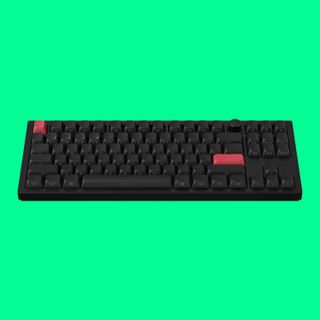
The best tenkeyless
With a superb build quality and delectable typing feel (seriously, that's not hyperbole), the Keychron Q3 Max is easily the most drool-worthy tenkeyless (TKL) keyboard we've tested.
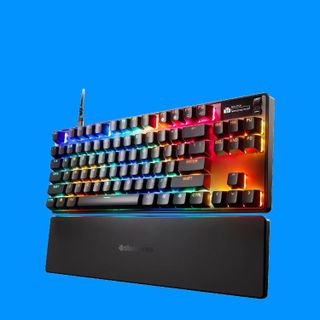
The best rapid trigger
The SteelSeries Apex Pro TKL Gen 3 uses the magic of magnets to deliver a gaming keyboard like no other. There's a whole bunch of flexibility here, a great typing experience, and superb build quality.
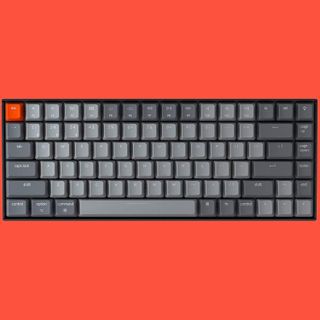
The best budget wireless
A handy entry-level mechanical board with a good build and set of features. The Keychron manages to deliver wireless connectivity for a fraction of the price of most others.
⬇️ Click to load more of the best gaming keyboards ⬇️
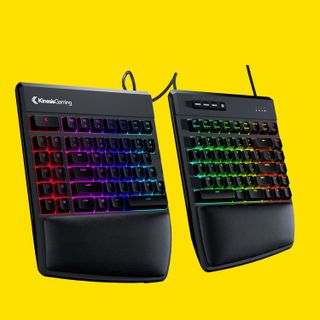
The best ergonomic
If you want to prioritise your health and posture while typing, you'd better opt for an ergo board. Luckily, that doesn't mean sacrificing any important gaming features, thanks to the Kinesis Freestyle Edge RGB's blend of both.
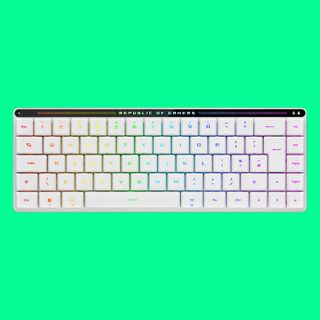
The best low profile
A snappy and responsive compact keyboard, the ROG Falchion RX Low Profile comes with lovely lubed switches to make gaming and typing a joy.
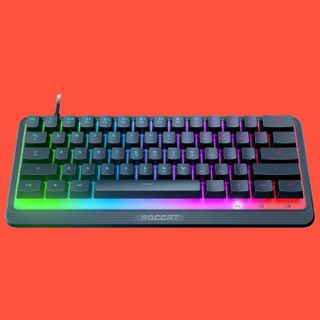
The best membrane
If instead of a mechanical board, you prefer the squishy flaoom of a membrane, this is for you. It's an eye-catching, surprisingly tactile membrane keyboard that doesn't break the bank.
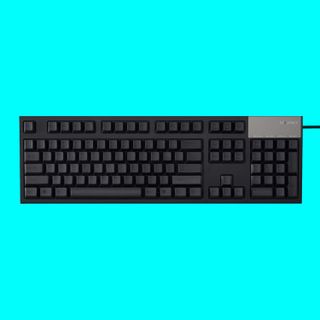
The quietest keyboard
Thanks to a unique key design and its own capacitive switches, the Realforce R2 is sort of a hybrid of mechanical and membrane keyboards. The good news is that it feels great to type on, and is as quiet as a church mouse.
Recent updates
Updated 12 December 2024 to check over our choices, improve navigation on the page, and tighten wording.
The best gaming keyboard






Specifications
Reasons to buy
Reasons to avoid
✅ You want the smoothest typing experience: With lubed switches out of the box, you don't need to waste any energy with a pot of lube and a paintbrush in order to get an immaculate typing experience.
✅ You want the best generalist gaming keyboard: You can find faster keyboards, and definitely flashier ones, but the ROG Strix Scope II 96 is by far the best generalist board and excels at a lot.
❌ You want speed or analog features: As fast as most other mechanical keyboards, nowadays you can find faster keyboards than this using Hall effect or optical switches.
The best gaming keyboard is the Asus ROG Strix Scope II 96 Wireless. It's rare that a keyboard is such an all-round joy to use as this is. There are faster, smarter, even cheaper boards—you'll find all of those recommendations below—but the Strix Scope II 96 Wireless brings together many of the features we're looking for in a modern gaming keyboard.
Firstly, some of the smoothest mechanical switches in the biz. You can pick between ROG-branded NX Snow or NX Storm switches in this board. I've been using the Snow switches, which are your regular linear dealio with an actuation force of 45g, though the Storm switches are a moderately heavier tactile option. These switches alone aren't anything special, but a little lube goes a long way.
A drop of lube on every mechanical key switch makes a surprising amount of difference to the typing experience. Each keypress is smooth, consistent, and every thwack produces a glorious clack. This lube is already pre-applied to each switch, which saves you the hassle of opening each one and applying it yourself. We've done that before and it can get messy.
Both of the available switches actuate at 1.8mm, which is pretty snappy, though not quite as snappy as the Corsair K70 Max at its lowest adjustable actuation point of 0.4mm. Similarly, the Strix Scope's polling rate is a mere 1000Hz—slower than the K70 Max at 8000Hz. Not that I noticed that in-game—the Scope II 96 feels extremely responsive.
It's also relatively quiet. The sound of the linear switches reduced to a light pitter-patter by the sound-dampening foam, sturdy PBT plastic keycaps, and switch pads. Lubed-up, sturdy stabilisers also keep the larger keys, namely the spacebar, quiet.
You are able to swap out any of the NX Snow switches on this keyboard for keys of your choosing. However, if you don't replace them with lubed switches I will personally hunt you down. Don't do the Scope II dirty like that.
The Scope II 96 is nearly a full-size board—it importantly retains a full numpad—though it's been squished down into a more compact chassis. As a result, the delete key is further away from your pinky than normal. It takes some getting used to, but I've been tapping away on it for a couple of weeks now and I feel I've got typing on the Scope II 96 down to a fine art.
Still, it's been a long time since I've been blown away by a gaming keyboard—so many seemed carbon copies of what Corsair did 10 years ago—but the Scope II 96 is mighty impressive. It focuses on nailing the actual mechanics of a mechanical gaming keyboard. Importantly, it's also great for gaming and doesn't cost anywhere near as much as its smaller, more premium sibling, the ROG Azoth.
Read our full Asus ROG Strix Scope II 96 Wireless review.
The best budget gaming keyboard







Specifications
Reasons to buy
Reasons to avoid
✅ You want a great typing experience for cheap: There's tons of quality to be found in this now-inexpensive keyboard. It feels closer to enthusiast than low quality, which is great for a budget board.
✅ You have a small desk: You can save room by trimming down your gaming keyboard. More room to flick your mice around or just fill with figurines.
❌ You're stuck in your ways: It might seem silly, but compact keyboards often require learning new typing tricks to do everything you're used to. If you're an old dog and don't want to learn new tricks, stick to a full-size or near-full-size board.
Now that it's dropped down in price, the Mountain Everest 60 is the best budget gaming keyboard. Our previous pick, the G. Skill KM250 RGB, is slightly cheaper than the Everest 60, but the G. Skill doesn't make much sense with the Everest 60 being a much better overall keyboard.
The Everest isn't just a small and wallet-friendly board, it's also incredibly practical, primarily because it's modular. Buy an attachable numpad and you can snap it into place on either side of the keyboard, which is more handy than many like to admit. Typing in long numbers is much easier with a numpad, and alt-codes require one, too.
This also lets you move your numpad to the left-hand side of the keyboard, which is the way God intended, as far as I can tell. At least for right-handed gamers, having the numpad on the left means you can use it and still have room to whip your gaming mouse around. And if you happen to be doing some data entry, having your right hand free to click around is handy.
However, there is a downside to fewer overall keys. Smaller keyboards like the Everest 60 just aren't always as convenient as full-size boards. Just ask the tiny right-side shift key.
It's not all about the form factor, though. The Everest 60 offers up some serious quality. The keyboard base's silicone layer adds weight and dampens key rattle, which is great if you're a heavy typist. It also houses two layers of foam, one on either side of the PCB, to improve the sound. Mountain has used genuine Cherry stabilisers, too, and has lubed them up properly for the Everest 60 to prevent rattle.
There are a few switches to choose from: Linear 45, Tactile 55 (denoting the 55cN force needed for actuation), and Linear 45 Speed (which has a shorter travel and actuation point).
Do note, however, that the Everest 60 doesn't come with the numpad, so you won't get that benefit for the fully budget price. There are some bundles packaging the two together, and ones that include the colourful new PBT keycap range, which can make it a bit cheaper. But not by much.
Even without the numpad, though, the Mountain Everest is an absolute steal at its latest prices. It's fantastic to type and game on and is well worth a look.
Read our full Mountain Everest 60 review.
The best mid-range gaming keyboard






Specifications
Reasons to buy
Reasons to avoid
Gaming keyboards are getting more and more expensive—looking at you, ROG Azoth Extreme. That's why we love this keyboard from Ducky; it's surprisingly affordable. The Ducky Zero 6108 gives us everything we're after and all for under $100/£100, an easy pick as the best mid-range gaming keyboard.
Ducky is pretty well known in the gaming keyboard world for producing sensible, reliable and sturdy keebs. The Zero 6108 might be the best modern example of that design mentality.
Take this thing out of the box and you'll be greeted with a fairly standard-looking gaming keyboard. It's full-size, though there are some extra media keys along the top right. Each cluster of keys has been slightly squished together to save on a bit of room, though it's still a pretty big keyboard by comparison to, say, the Q3 Max or Mountain Everest 60.
Each switch is adorned with a PBT keycap—these generally last longer than ABS—and most come pre-applied with lube. If you're noticing a pattern in this guide, that I'm mentioning lube a lot, it's because it really feels like the biggest improvement we've seen in gaming keyboards in a little while now, outside of perhaps Rapid Trigger for competitive gamers.
The Cherry MX2A switches included on the Zero 6108 are great. They're the Cherry switches we've come to know and love over the years, much improved for 2024. The MX2A Blue switches we reviewed don't actually have any lube applied, though they're less for gamers than the Red or Brown switches, which do. Our reviewer Reece has plenty of good things to say about the new Blue switch, and we've tried the new Red switch within the Cherry Xtrfy K5V2 and have plenty of good things to say about those, too.
To say the Zero 6108 comes with few frills would be wrong. There's per-key RGB lighting and you can get it in a gorgeous white finish like the one we looked at for review. The RGB can be controlled via the board itself, too, to save on unnecessary apps clogging up your PC.
What's most surprising about the Zero 6108 is its wireless connectivity. We've seen some manufacturers ramp up prices for the inclusion of wireless 2.4 or Bluetooth connectivity, and yet others, such as Ducky and Keychron, seem averse to raising prices all that much for it. That's fantastic news for this Zero 6108, which feels reasonably priced even without the wireless connectivity.
So, new switches, full-size, RGB lighting, media controls... and it's from a respectable brand with a good reputation for long-lasting products? Yeah, you can see why the Ducky Zero 6108 ranks so highly for us.
Read our full Ducky Zero 6108 review.
The best tenkeyless gaming keyboard







Specifications
Reasons to buy
Reasons to avoid
✅ You want the complete package: I've tried many tenkeyless keyboards over the years, and none get so much right as the Keychron Q3 Max.
❌ You are looking for affordable excellence: The Q3 Max delivers excellence, but it's far from affordable.
A delightful typing experience wrapped in a weighty block of aluminum, the best tenkeyless gaming keyboard has to be the Keychron Q3 Max.
Don't be fooled into thinking the tenkeyless (TKL) gaming keyboard market isn't as competitive as the full-size one. It absolutely is. We've tested heaps of excellent TKL boards over the past few months alone, such as the Razer Huntsman V3 Pro TKL and ROG Azoth—two fantastic keyboards from big names in the industry. And still we've come away most impressed by the Q3 Max.
Keychron isn't a household name, though with more boards like this, and the K2 below, it's going to make one helluva name for itself.
The Q3 Max is crafted out of a piece of thick, machined aluminum. It weighs a whopping 2.045 kg as a result. Don't be put off by that, however. We often find heavier keyboards are sturdier and offer a much-improved typing experience over lighter, flimsier boards.
That's the case here. The Q3 Max is a dream to type on. The many layers making up its construction include sound-dampening foam, film, a latex pad and more foam. This produces a steady and consistent typing experience that's on another level next to some.
And the sound of it. The Q3 Max sounds divine.
One of the key benefits of a TKL keyboard is that it takes up less room than a full-size keeb. That means lopping off the numpad, hence the name, and usually losing other extraneous features, such as dedicated media keys. However, we've seen a growing trend for keyboard manufacturers to stuff some sort of media controls elsewhere, and that's exactly what Keychron has done here.
The Q3 Max comes with a knob, otherwise known as a dial, which offers volume up/down, zoom in/out, brightness up/down, or a whole lot more. It's whatever you want it to be, within reason, and changeable via the open source QMK firmware keymap tool, Launcher. Launcher is available to use via a browser, which is pretty neat.
Each key on the Q3 Max is fitted with an RGB backlight, which is also controllable via that same dial and the onboard shortcut keys. There are three switches to choose from: Gateron Jupiter Red, Brown and Banana. All three come pre-lubed, which means like the ROG Strix Scope II 96, they're slick to type on.
With wireless functionality across 2.4 GHz via a provided dongle and Bluetooth, or a wired USB Type-C connection, you have a pick of options for connectivity. The battery is a good 180 hours on paper with the backlight disabled, or 100 hours with it on, and in practice, we rarely had to reach for the USB cable to charge the Q3 Max.
Though it does cost a fair chunk of cash, which is to be somewhat expected, but doesn't make it sting any less. At least you can be sure you're getting your money's worth. A simply fantastic TKL gaming keyboard and office hero, the Keychron Q3 Max really is the complete package.
Read our Keychron Q3 Max review.
The best rapid trigger gaming keyboard




Specifications
Reasons to buy
Reasons to avoid
✅ You want a responsive and customisable keyboard: This keyboard is super snappy thanks to its Hall effect switches which allow for complete customisation over actuation depth and so on, not to mention the snappy response of Rapid trigger.
✅ You want a keyboard that thocks: The Apex Pro Gen 3 has had its typing sound and feel improved compared to the previous generation, and it really shows.
❌ You're on a budget: Because it's high-quality and has Hall effect switches, the Apex Pro Gen 3 isn't as cheap as some other gaming keyboards.
The SteelSeries Apex Pro TKL Gen 3 is the best rapid trigger gaming keyboard. What the heck does that mean? It means this keyboard employs Hall effect switches to its benefit in competitive games. By measuring when a user releases a key and 'resetting' it faster than would be possible on a standard mechanical switch, this keyboard can improve a user's response time in games like Valorant and Counter-Strike 2.
With Hall effect, there's a magnet within the stem of every switch, and by measuring the magnetic force of that magnet as it moves through a Hall effect sensor on the keyboard's PCB, the SteelSeries Apex Pro TKL Gen 3 is able to accurately track the full depression and return of the mechanical switch. Since this isn't predetermined by the switch itself, you can adjust the operating position and reset point accordingly in a keyboard's firmware.
Rapid trigger is a feature that intuitively changes the reset point based on each key press. So, when you press a key, the reset point is always engaged the moment you release it. This means you can then depress the key again without having to fully release it each time. For competitive games, that extra time saved on every key press can be pretty important.
There are a few Hall effect keyboards on the market right now, and while each has its benefits, the Apex Pro Gen 3 takes the crown for a number of reasons.
For one, it has an OLED screen, which can be used to change keyboard settings and so on, or display a black-and-white GIF of your choosing. It also THOCKS surprisingly well for a Hall effect keyboard, putting even some enthusiast keyboards to shame. It also has a stellar 0.1–4 mm Rapid trigger sensitivity, making it extra snappy.
Its price tag, while expensive, is pretty reasonable given you're getting all this, which is why it's the best rapid trigger keeb on the market right now.
Read our full SteelSeries Apex Pro TKL Gen 3 review.
The best budget wireless gaming keyboard






Specifications
Reasons to buy
Reasons to avoid
✅ You must have a cable-free connection: You don't actually have to spend loads to ditch wires on the desktop. This keyboard is proof of that.
❌ You want RGB lighting: You won't find anything more than white LEDs here, so don't even think about rainbow puke presets.
The best budget wireless gaming keyboard comes from a brand you might not be overly familiar with. The Keychron K2 has all the makings of a decent little wireless mechanical keyboard, however, and it's wonderfully affordable.
The Keychron K2 has marked itself out as a marvellous entry-level keyboard that can act as a gateway into the wider world of mechanicals. It's a simple mechanical keyboard in a 75% format—that's less keys than a full-size board but isn't quite as tough to get to grips with as a 60%.
For more of an affordable board, the build quality is surprisingly sturdy. That's even more surprising when you consider that many keyboard makers pump up prices once they add in wireless connectivity, yet here's an affordable board that's good quality and ditches the cabled connection. It'll connect over USB Type-C and Bluetooth alongside the wireless connection, too.
The only downside from a purely aesthetic point of view is the lack of RGB lighting. You'll only find white backlighting here, which is good for nighttime use but not much of a light show. Some prefer that, however, and if you're looking to save some money then ditching RGB lighting is one of the easiest ways to do that.
In essence, the Keychron K2 is a handy entry-level mechanical keyboard, and for $69 or so, you can’t necessarily go wrong. Its build quality is decent with a nice bit of weight, and the triple device connectivity is handy if you’re flitting between devices over the course of a working day. With that said, though, sometimes it can feel like a cheap keyboard—light switches with an audible ping and standard lighting presets don’t help it too much in some cases.
All in all, though, if you’re looking for a budget wireless keyboard, the Keychron K2 is the best choice. It might not be perfect, but it's a darn sight better than everything else in its price range.
Read our full Keychron K2 review.
The best ergonomic gaming keyboard






Specifications
Reasons to buy
Reasons to avoid
✅ You want the best ergonomic gaming experience: You'll find more ergonomic keyboards, and more gaming ones too, but you'll not find a keyboard that blends the two worlds quite as well as this one.
❌ You're on a tight budget: Ergo boards aren't known for being cheap, and this gaming-specific one requires the extra $30 lift kit to unlock its full potential.
The Kinesis Freestyle Edge RGB has been specifically designed to blend the best of ergonomic and gaming keyboards, which is why it ranks as our pick for the best ergonomic gaming keyboard overall.
The most striking feature of the Kinesis has to be its split design. A single cable connects the two halves, and this offers you the freedom to shift it into a position that's more comfortable long-term. The best practice is to loosely keep both halves in front of your hands without having to turn in at all at the elbows. Not only is this good for your wrists but it's good for your arms and shoulders, too.
The split design does mean you need to be pretty comfortable typing with both hands across both halves. No problem for touch typists or anyone who glues their index fingers to F and J, but if you tend to stab from the centre it can take a bit of adjustment. Compared to some ergo boards this layout isn't too taxing at least.
The wrist rests are built into each half of the Freestyle Edge RGB, and they're plenty plush for long-term gaming or typing. Though if they're not to your liking, you can detach them and replace them with something more your speed. What's a bit of a surprise is that the Kinesis doesn't come with a lift kit included in the box, it's sold separately. That means you're a bit more limited in adjustments you can make to the Kinesis compared to some ergo boards. Still, it does make up for it with some excellent gaming-specific features.
Cherry MX mechanical switches mean this ergo keyboard isn't a slouch for gaming, and of course, there's fully adjustable RGB lighting on a per-key basis.
All in all, the Kinesis Freestyle Edge RGB is a seriously good ergonomic gaming keyboard and one that shouldn't be glossed over even if you were originally thinking of a more standard layout. Ergo keyboards are legion at this point, but the Kinesis Freestyle Edge RGB is the best we've tested to date.
Read our full Kinesis Freestyle Edge RGB review.
The best low profile gaming keyboard





Specifications
Reasons to buy
Reasons to avoid
✅ You prefer a low wrist position: There's no need to bend your wrists as much with the Falchion RX, thanks to its low-profile design.
❌ You want a numpad or a function row: You won't find either on the Falchion RX. It's minimal, baby.
The best low profile gaming keyboard has to be the Asus ROG Falchion RX Low Profile. It's an important category, too, as low profile boards are something you try once and then never swear off.
The Falchion RX is an extremely compact board, both height-wise and width-wise. It's only a 60% layout, which means a few keys are missing. If you count a few as the entire function row and numpad, that is. It does keep hold of the arrow keys, however, which is important for gaming. Plus the function keys are labelled and accessible via the function toggle key.
If you can get past its small stature, the low profile switches from Asus inside this keyboard are fantastic. Much like the Strix Scope II 96, they're all pre-lubed out of the factory. That's more important than it sounds. These switches are silky smooth, sound great, and are a joy to type on. The only downside is the keycaps used by Asus are not your normal fitting and may be harder to replace if one were to break.
Luckily, the keyboard comes with a case that fits over the top of the keys for easy and safe transit.
You may be surprised to hear there are volume controls on the Falchion RX. Along the top of the board, actually away from the front face, there's a capacitive volume slider. It can also control other functions and altogether is a handy inclusion I wasn't expecting to see on this compact form factor.
You will have to part ways with a fairly high amount of cash for the Falchion RX Low Profile, despite having so many fewer keys than some on this list. A small price to pay for a great keyboard? You can be the judge of that. Still, when it comes to low profile, the Falchion RX Low Profile is the winner here.
Read our full ROG Falchion RX Low Profile review.
The best membrane gaming keyboard





Specifications
Reasons to buy
Reasons to avoid
✅ You're prone to spills: Membrane keyboards are naturally quite spill-resistant. Though they will still get gunked up if you're not careful to clean them off as best you can.
❌ You want a tactile and speedy response: Membrane boards are nowhere near as lovely to use as mechanical in most users' opinions.
The Roccat Magma Mini is the best membrane gaming keyboard. That might sound like somewhat of an oxymoron given mechanical keyboards are all the rage these days, but there are still reasons one might opt for a humble membrane keyboard.
For one, some prefer the softer sound and feel of a membrane keyboard. They might be objectively wrong, but they're entitled to be so (kidding!). Membrane keyboards do have a certain soft appeal to them of a kind that even a super-light mechanical keyboard will struggle to replicate.
Plus, membrane keebs are much more dust- and water-resistant than mechs. This Magma Mini, for instance, is IP33 rated, meaning it's "protected against solid foreign objects of 2.5mm and greater" and "protected against spraying water". Which is just a weirder way of saying it's somewhat dust- and water-resistant.
There are plenty of membrane keyboards out there, of course, but the Magma Mini costs relatively little, feels great, and looks amazing in its own, unique way. It is, of course, essentially a smaller version of the Roccat Magma, which is one of the most unique RGB designs we've seen as the entire top plate glows.
Whether we're talking a full-sized Magma or this Mini version, it's incredibly quiet and yet reasonably tactile in that still-somewhat-spongy membrane kind of way. Throw in the eye-catching aesthetic, dust-resistance, water-resistance, and a more than reasonable circa-$50 price tag, and you have a great choice for membrane lovers.
Of course, membrane keyboards aren't for everyone, but if you prefer a squidgy feel and are looking for a keeb that won't break the bank, this is the best membrane keyboard we can think of.
Read our full Roccat Magma Mini review.
The quietest gaming keyboard


10. Topre Realforce R2
Our expert review:
Specifications
Reasons to buy
Reasons to avoid
✅ You want quiet, with excellent typing feel: Topre's own-brand switches are a hybrid of mechanical and membrane design and are whisper quiet. They feel great to type on, too.
❌ You want more features: This is about as straightforward as keyboards come. No media keys, no fancy features, just excellent switches and a default-looking board.
If you're looking for a quiet keyboard, you've come to the right place. The Topre Realforce isn't cheap, nor is it flashy, but its hybrid switches are whisper-quiet in action, without sacrificing typing feel. That makes it the best quiet keyboard you can buy right now.
A few things up front: it's not cheap, nor is it flashy. In fact, you could be forgiven for thinking that the Realforce R2 is a particularly dull-looking keeb. Still, there is an RGB backlit version for a bit more flair, but if all you want is super quiet typing and a great feel, this plain-looking board has you covered.
Those switches are, in a word, excellent. The typing feel here is springy, but with good actuation force that means it still has a degree of feedback that makes it a real pleasure to type on. Those trick switches manage to achieve something very few keyboards can pull off—a great typing experience while remaining quiet enough that you won't annoy everyone around you with your clicking and clacking.
You can get full-on membrane keyboards that are technically quieter, sure, but you'd be sacrificing the day-to-day experience, and really that's why you want a good keyboard in the first place. This manages to exist in both worlds, which is quite the party piece.
It's not totally silent, of course. There's still a little rattle to each PBT keycap press, but it doesn't have a distinctive clack or clank like most mechanical boards. It's more of a dampened thud, which is a much more pleasant noise to listen to for your office mates, partners, family pets or otherwise.
It's quiet, well-made, and simply a great keyboard to type on. Quiet keebs are technically everywhere, what with the gamut of membrane options out there, but the Topre Realforce R2 really is the best. Typing feel, straight-ahead design, and relative silence. A very good keeb indeed.
Also tested
Wooting 80HE
The Wooting 80HE makes for a capable gaming keyboard with lots of power and a meaner look, although at the expense of a chassis with some flex.
PC Gamer score: 78%
Read our full Wooting 80HE review.
Keychron Q5 HE
The Keychron Q5 HE is a brilliant mechanical keyboard with lots of power, a stylish chassis and thoughtful touches elsewhere.
PC Gamer score: 82%
Read our full Keychron Q5 HE review.
Lemokey L4
The L4 is the slightly less specced brother to the Keychron Q3 Max, and at the same price, is a bit of an odd recommendation. Make no bones about it, this is a gorgeous keyboard that's packed to the rafters with features, but the Max is better.
PC Gamer score: 85%
Read our full Lemokey L4 review.
Glorious GMMK 3 HE
The standard GMMK 3 HE is merely the starting point for keyboards to come, but it's too plastic-y for my liking, particularly given the asking price. The customisation options are immense, however, and the end results can be magnificent.
PC gamer score: 73%
Read our full Glorious GMMK 3 HE review.
Endgame Gear KB65HE
A fantastic gaming keyboard for the price with powerful and snappy switches, as well as one of the sturdiest chassis available at this level, and some lightweight software that offers good customisation. Other options may look better, but the KB65HE beats them with its power.
PC Gamer score: 88%
Read our full Endgame Gear KB65HE review.
G. Skill KM250 RGB
This was our previous pick for the best budget gaming keyboard, but the Mountain Everest 60's price drops have made it a better choice. Nevertheless, the MK250 RGB is a cracking little keyboard and is well worth its low cost.
PC Gamer score: 90%
Read our full G. Skill KM250 RGB review.
Alienware Pro Wireless
Stunning RGB and a refreshingly old-school feel matched with modern looks—there's a lot to like about the Wireless Pro. It's pricey though, and faces some tough competition for the cash.
PC Gamer score: 84%
Read our full Alienware Pro Wireless review.
Logitech Pro X 60
It's as fast as you like, this esports keeb, but also a noisy beast. It's very well-made, but there are more civilised keyboards available for less.
PC Gamer score: 77%
Read our full Logitech Pro X 60 review.
Razer BlackWidow V4 75%
A great way into hot-swappable keyboards, the BlackWidow V4 75% is just pipped to the top spots by other keebs we found more exciting for the cash.
PC Gamer score: 75%
Read our full Razer BlackWidow V4 review.
Asus ROG Azoth
The Azoth is a mighty high-end gaming keyboard in a miniature package. It's wonderful and used to rank in this guide, though we think the Q3 Max from Keychron just about does it better sans screen.
PC Gamer score: 90%
Read our full Asus ROG Azoth review.
Corsair K65 Plus
Corsair hasn't skimped out with the K65 Plus, covering all the basics you'd want from a compact keyboard of that price, and topping it with a great battery life. The company assumes non-linear switch likers already have key switches ready to swap out, though, offering zero alternatives to its own linear reds with the base model.
PC Gamer score: 88%
Read our full Corsair K65 Plus review.
Das Keyboard 6 Professional
A sublime mechanical keyboard that nails the basics, with thoughtful physical touches and a comfortable, tactile typing experience. The Das Keyboard 6 Professional looks smart and feels fantastic, even if it lacks any software.
PC Gamer score: 90%
Read our full Das Keyboard 6 Professional review.
Razer Huntsman V3 Pro TKL
There are a lot of impressive TKL keyboards on the market today. The Razer is one of them, if only beaten out by the Q3 Max for the money.
PC Gamer score: 85%
Read our full Razer Huntsman V3 Pro TKL review.
Cherry Xtrfy K5V2
Cherry's new switch is a marked improvement over its extremely popular and widespread predecessor, and the Xtrfy K5V2 keyboard is a lavishly lit and sturdy home for them. Though there are nicer feeling, and cheaper, compact keyboards on the market.
PC Gamer score: 71%
Read our full Cherry Xtrfy K5V2 review.
ZSA Moonlander
For a high price, you can score a slick ergonomic keyboard with huge flexibility. It's not exactly a gaming keyboard, but for a long-term typist, it's absolutely fantastic.
PC Gamer score: 89%
Read our full ZSA Moonlander review.
Drop Sense75
An awesome custom keyboard with an especially high price tag to match. The Sense75 is a marvellous board with great switches, gorgeous RGB and great construction, but only worth considering if you’ve got deep pockets.
PC Gamer score: 71%
Read our full Drop Sense75 review.
Logitech G915 X Lightspeed
The Logitech G915 X Lightspeed is a pretty nice gaming keyboard, with low latency play and good battery life, but it's let down significantly by its price and Logitech's software
PC Gamer score: 70%
Read our full Logitech G915 X Lightspeed review.
How we test gaming keyboards
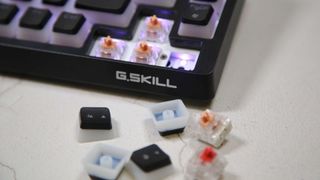
We've years of experience testing gaming keyboards on team. Each and every keyboard included in this guide has been reviewed by a professional. To do that, we use the keyboard extensively during the test period, inspect the switches, utilize the software, and use any special features the keyboard may have.
A big part of a keyboard's quality is how it feels to type on, and that comes down to the key switches. Are they sticky? Are they smooth? Do they feel like they're filled with sand? Have they been lubed? There are a lot of variables for just the key switches alone. We know what is best for gaming and typing, and what definitely isn't.
As for the keyboard, the layout can be a sticking point for some, as well as where the media keys are placed. Even the typeface is a key point of contention for these boards, and we do judge them on every aspect to make sure we've picked the best for your money.
How to spot the best deal
Where are the best gaming keyboard deals?
In the US:
Amazon - Savings on PC gaming peripheralsWalmart - Still some good savings on Razer mice and keyboards
Best Buy - Up to $105 off your next mechanical keyboard
Target - Budget gaming keyboards up to $40 offStaples - Discounts on Microsoft ergonomic and gaming keyboards
Drop - Save up to 35% on enthusiast keyboards
In the UK:
Amazon - Mechanical gaming keyboards down to half price
Ebuyer - Big savings on Logitech keyboards
Box - Save up to £60 on wireless keyboards
Argos - Decent prices on budget to high-end keyboards
What is the big deal with mechanical switches?
We can talk for hours about the feel of mechanical switches versus membrane switches, but ultimately that's a personal choice. What makes mechanical switches objectively superior, however, is their far-extended life span. They can take far more punishment and keep responding long after a membrane switch has collapsed in on itself.
Why do gamers use 60% keyboards?
The main reason gamers will use compact 60% keyboards is because the smaller form factor allows for more space for your gaming mouse. That means you can have to DPI levels in your mouse lower, offering greater accuracy but also necessitating wider sweeping movements.
It also means that your hands resting on the WSAD keys and the mouse are closer together, which in turn improves the ergonomic posture, either when gaming or simply using your computer.
What is the most important thing to look for in a mechanical gaming keyboard?
The switch type is arguably the most important choice to make when picking your new gaming keyboard. Cherry mechanical switches are the most common and most recognizable, but there are a host of alternatives on offer, as well as a bunch of upmarket, specialist switches to choose from.
Are dedicated media controls a deal-breaker?
Only you can make that call, but we would suggest that at least having the option to toggle the top row between function and media controls would be our choice. Having a discrete volume wheel can be super useful, however.
What size of keyboard do I need?
Keyboard size is absolutely a defining factor. Full-sized keyboards tend to offer the most features and a Numpad, but if you don't have space, then all of those extras you paid for will be useless. Tenkeyless boards (the ones with no number pad) and compact keyboards can be a great option, too, if you don't care about all the extra bells and whistles or you don't have any use for alt codes (how barbaric!).
Jargon buster
Actuation Point
The height to which a key needs to be pressed before it actuates and sends an input signal to a device.
Clicky
A switch that delivers an audible click every time it's pressed, generally right around the point of actuation.
Debounce
A technique to ensure that only one input registers every time a key is pressed.
Housing
The shell that surrounds the internal components of a switch.
Hysteresis
The result of the actuation point and reset point in a switch being misaligned. This generally means a key needs to be lifted off further than normal before it can be actuated again.
Linear
A switch that moves directly up and down, generally delivering smooth keystrokes without noise or tactile feedback.
Mechanical Keyboard
A keyboard built around individual switches for each key rather than a membrane sheath mounted on a PCB.
Membrane Keyboard
A keyboard on which all the keycaps are mounted on a membrane sheath; when a key is pressed, a rubber dome depresses and pushes against the sheath and PCB beneath, actuating the key.
Stem
The component of a switch on which the keycaps are mounted on a mechanical keyboard.
Switch
The physical component of a mechanical keyboard beneath the keycaps on a mechanical keyboard. The switch determines how a key is actuated, whether or not it provides audible or tactile feedback with each press, and more.
Optical switch
This is a type of mechanical switch which instead of a physical metal contact switch uses light to measure when actuation takes place. These can be more configurable too, allowing for not just off and on states, but more analog designs, and even dual actions for a single key depending on how far the switch is pressed down.
Tactile
A switch that provides a 'bump' of feedback every time it's pushed.
Tenkeyless (TKL)
A keyboard that lacks the right-hand number pad.
The biggest gaming news, reviews and hardware deals
Keep up to date with the most important stories and the best deals, as picked by the PC Gamer team.

Jacob earned his first byline writing for his own tech blog. From there, he graduated to professionally breaking things as hardware writer at PCGamesN, and would go on to run the team as hardware editor. He joined PC Gamer's top staff as senior hardware editor before becoming managing editor of the hardware team, and you'll now find him reporting on the latest developments in the technology and gaming industries and testing the newest PC components.
- James BentleyHardware writer
- Reece Bithrey
- Dave JamesEditor-in-Chief, Hardware
- Andy EdserHardware Writer
Most Popular


